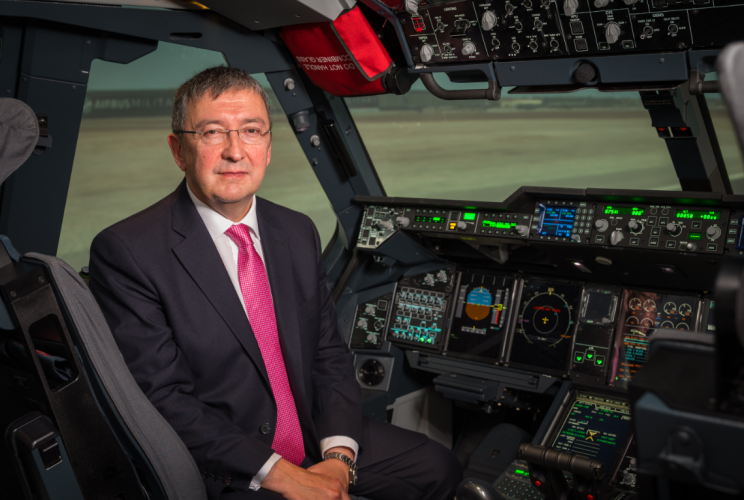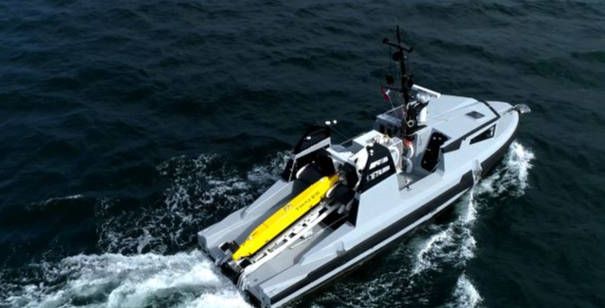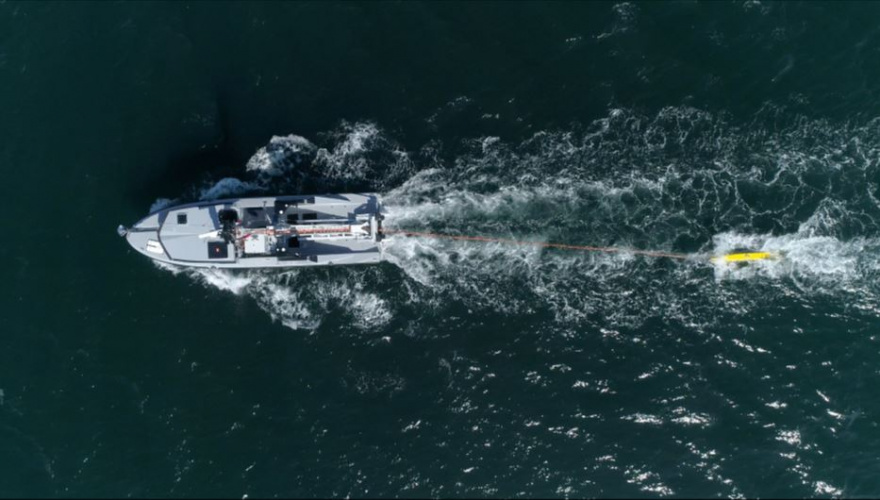
Given Victor Chavez’s background, it’s perhaps no surprise that he ended up at the helm of one of the UK’s biggest naval contractors.
“You might not get it from my surname, but I was born in Barrow-in-Furness in Cumbria,” Chavez told The Engineer. “My father ran off to join the Chilean Navy at the age of 15. My mother was British and they met when Vickers in Barrow was building ships for the Chilean Navy. So I am the product of a defence exports sale, which seems entirely appropriate!”
Chavez was speaking on the back of a Thales UK roundtable on maritime autonomy that the chief executive had chaired himself. Having joined the company in 1999, he graduated to the top job in 2011. Thales today counts more than 50 of the world’s navies as customers, many of whom view autonomy as a growing priority.
“Maritime defence is basically our biggest sector as Thales UK, so maritime autonomy is naturally an area that we’re gravitating to and it’s a huge opportunity for navies around the world,” Chavez said.

He points to the dominance of Predator drones in the unmanned aerial market when they arrived more than 20 years ago. By comparison, no such hegemony exists in the maritime world, giving space for a broader ecosystem to evolve. Thales UK’s expertise in mine clearance puts it in prime position to be part of that ecosystem, according to the CEO.
“Not only is maritime our major sector, but mine countermeasures and mine hunting is an export product and capability that we’ve been providing for decades to the Royal Navy. And mine clearance is one of the most obvious use cases for autonomy,” he said.
“We’re at that transition where navies around the world will start buying autonomous systems and phasing out historic mine countermeasures vessels. So, for us it’s existential that Thales UK succeeds in this market.”
_________________________________________________________
Further reading
- Navy vessels get Thales digital situational awareness system
- Thales wins Netherlands MoD radar support contract
- Royal Navy to develop autonomous AI mine-hunter
_________________________________________________________
Mine hunters may be the obvious entry point for autonomous naval vessels, but there is a much wider maritime market on the horizon. This raises the question of data and communications. In a future where fleets of autonomous or unmanned vessels rule the waves, will satcoms be capable of relaying all that data? Chavez, whose academic background is in physics and satellite engineering, says the current infrastructure is sufficient but that defence systems are rarely built to rely on satcoms alone.
“As we all know with bandwidth, the more you give the more we use,” he said. “For defence autonomous systems, we design them to be robust in the face of a hostile RF [radio-frequency] environment as well.”
In many instances, this means redundancy that allows platforms to operate in the complete absence of satcoms. “You can use satellite if it’s there. If it’s not there, then you have to make do with something else. So, it teaches us to be very meagre in terms of our data rates; we really will compress everything down as far as humanly possible.
“We’re at that transition where navies around the world will start buying autonomous systems and phasing out historic mine countermeasures vessels"
“As capacity increases, it gives us the opportunity for ever-richer analysis, because we’ll have a richer data set to look at. At the moment, we have to rely on smarter algorithms on board to compress data sets in certain scenarios.”
Satcoms for surface vessels may not be a problem, but subsea communications remain a stubborn conundrum. To reach submarines or unmanned underwater vehicles (UUVs) at significant depths, radio signals need to be in the extremely low frequency (ELF) range, generally considered to be between 0-300Hz. Creating these mega longwave transmissions requires grounded wire antennas up to 60km long that use huge amounts of energy, sometimes requiring their own power stations. Even then, communication is limited to just a few characters per minute, with submarines often simply instructed to climb to periscope depth so that more detailed orders can be given via traditional RF methods.

“It’s a little bit specialised,” Chavez joked. “Whales seem to be quite good at it.”
Although research is ongoing, the Thales UK chief admits that subsea comms is a technical issue that may never be solved.
“The laws of physics tend to be fairly immutable in that respect.”
Tomorrow’s engineers may not be expected to solve the problem of subsea communication, but skills around autonomy will be a prerequisite for many. Indeed, Thales sees unmanned vessels as something of a honeypot for the maritime sector. Where the brightest and best may once have been lost to the ‘sexier’ disciplines of aerospace and automotive, the rapid advances in maritime autonomy could help redress the balance.
“We do really see things such as autonomy and robotics as exciting the next generation of talent in engineering, and people who are interested in STEM want to work on new technologies and capabilities,” said Chavez.
“At Thales we’re currently working on unmanned air vehicles, unmanned surface vehicles, unmanned underwater vehicles, autonomous trains, unmanned air traffic management, and satellites, which are pretty autonomous once you put them up there.”
Autonomy in the maritime segment – particularly in commercial shipping – could also help substantially reduce emissions, striking a chord with climate-conscious millennial engineers.
“There’s no doubt that maritime autonomy has a good potential in exciting people and, as with all autonomous systems, they actually require a wide range of engineering disciplines,” said Chavez.
One of those disciplines will be cybersecurity and the area of digital trust. In April, Thales completed the €4.8bn acquisition of Dutch software firm Gemalto, specialists in digital identity and biometrics. The company will become Thales’s seventh global division, named Digital Identity and Security (DIS). According to Chavez, Gemalto’s capabilities will benefit the entire Thales Group.
“They are at the heart of all of the digital identity and security that you touch and use every day of your lives, whether it’s SIM cards in your mobile phone or the security for the banking and payment card in your wallet,” he explained.
“It’s quite a different sector for us. It’s a much more ‘civil’ sector, a more mobile tech sector. And that’s really exciting because we will transform all of our businesses using these technologies, regardless of which sector it is. Digital trust is at the heart of securing all of those autonomous systems, for example… and as we become more and more dependent on these capabilities, advanced trust architectures are the answer to how we can trust these systems with our lives.”
With Brexit looming, Thales is again preparing for possible disruption to its supply chains. It’s a worry, but not one that Chavez seems to be losing sleep over. Having ramped up preparations in March, the company will be doing similar ahead of the 31 October deadline. As for any skills squeeze, Thales should be insulated from the worst of it by the nature of its business.
“Because we do a significant element of defence work in the UK, the vast majority of our people are UK nationals, but as you’d expect we do have some non-UK EU nationals as well,” said Chavez. “And it’s really important that we retain access to this sort of talent.”
Key to that, according to Chavez, will be a responsive visa regime that enables swift access to overseas engineers. Boris Johnson’s recent announcement for just such a system will no doubt be welcomed by the Thales UK chief. As always, however, the devil will be in the detail. The future of the high seas may well be unmanned, but the human skills required to build that future have never been more in demand.











Water Sector Talent Exodus Could Cripple The Sector
Maybe if things are essential for the running of a country and we want to pay a fair price we should be running these utilities on a not for profit...